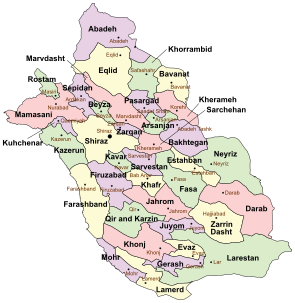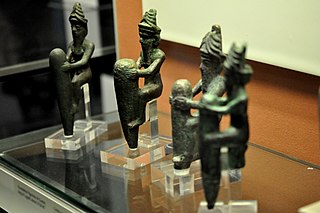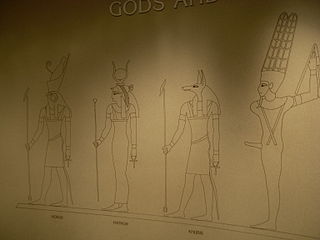Zurvan is the primordial creator deity in Zurvanism, a now-extinct branch of the Zoroastrianism religion.
Zurvan may also refer to:
- Time in Avestan Middle Persian
- Zurvan (زروان), a village in Larestan County, Fars, Iran.

Time is the indefinite continued progress of existence and events that occur in apparently irreversible succession from the past through the present to the future. Time is a component quantity of various measurements used to sequence events, to compare the duration of events or the intervals between them, and to quantify rates of change of quantities in material reality or in the conscious experience. Time is often referred to as a fourth dimension, along with three spatial dimensions.

Larestan County is a county in Fars Province in Iran. The capital of the county is Lar. The county has nine cities: Lar, Evaz, Beyram, Banaruiyeh, Fishvar, Juyom, Khur, Latifi & Emad Deh. The county is subdivided into six districts: the Central District, Beyram, Evaz District, Banaruiyeh, Sahray-ye Bagh, and Juyom.
In popular culture:
- Zarvan (زَروان), the personification of time in Shahnameh
- Zurvan, an alien intelligence in the Palladium Books RPG games that sometimes creates gods as an experiment
- Zurvan, the primary antagonist of Prince of Persia: The Two Thrones
- Zur-van, a superhero in Grant Morrison's The Filth (comics)
- Zurvan, the name of one of the Four Gods of Runepunk in Savage Worlds
- Zurvan, a minor antagonist in StarCraft II: Heart of the Swarm
- Zurvan, the name of one of the Amp Stations in Planetside 2

The Shahnameh is a long epic poem written by the Persian poet Ferdowsi between c. 977 and 1010 CE and is the national epic of Greater Iran. Consisting of some 50,000 "distichs" or couplets, the Shahnameh is the world's longest epic poem written by a single poet. It tells mainly the mythical and to some extent the historical past of the Persian Empire from the creation of the world until the Arab conquest of Iran in the 7th century. Modern Iran, Azerbaijan, Afghanistan and the greater region influenced by Persian culture celebrate this national epic.

Palladium Books is a publisher of role-playing games (RPGs) perhaps best known for its popular, expansive Rifts series (1990–present). Palladium was founded April 1981 in Detroit, Michigan by current president and lead game designer Kevin Siembieda, and is now based in Westland, Michigan. The company enjoys the support of a small but dedicated fanbase who praise its various game series for their innovative settings and ease of adaptability to various personal preferences, play styles, and power levels.

Prince of Persia: The Two Thrones is an action-adventure video game developed and published by Ubisoft Montreal. It was released in December, 2005 in North America for the Xbox, Microsoft Windows, PlayStation 2, and the Nintendo GameCube. It was ported to the PlayStation Portable and Wii, under the title Prince of Persia: Rival Swords with the Wii version utilizing the motion-sensing functionality of its controller, while the PSP version added exclusive content. A remastered, high-definition version of The Two Thrones was released on the PlayStation Network for the PlayStation 3 on December 21, 2010.







